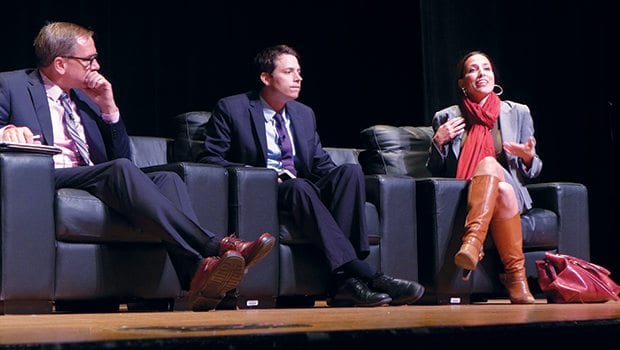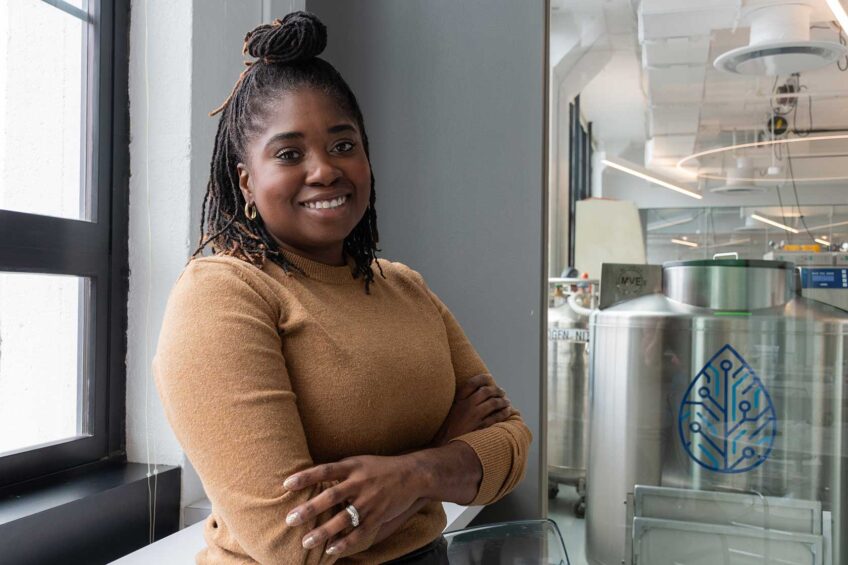From classroom to college or to cell
Sheriff Tompkins holds forum on ending the school-to-prison pipeline

Saying he wanted to turn the school-to-prison pipeline into a cradle-to-career pipeline, Steven Tompkins, Suffolk County sheriff, convened a panel of education experts at Roxbury Community College last week. “The State of Education: A Conversation About Academics in The Commonwealth” forum speakers aired views on education improvements that could help keep youth on the right path.
“The education system is really going to be a roadblock to the incarceration system,” said Tompkins.
Prison problem
The high rate of incarceration damages inmates and their families and is costly to tax payers. If new and stronger educational efforts can prevent individuals from entering the criminal justice system, the sheriff’s department predicts the commonwealth would save tens of thousands of dollars.
It costs $50,000 per year to incarcerate an individual, Tompkins said. By comparison it costs approximately $14,000 to educate a child in Massachusetts, and about $17,500 in Boston, said Peter Van Delft, sheriff department spokesperson.
“Something is grossly wrong with the way we are prioritizing our dollars,” Tompkins said. “Do we continue to warehouse people or do we correct situations?”
Dropped out and locked up
Education, especially college level, was cited as a major crime deterrent.
“We know if you stay in the system, you go to college, you don’t go to jail,” said Mark Culliton, CEO of College Bound Dorchester. CBD helps high school dropouts, including many gang-involved youths, get on the path to college. Those who wind up at the sheriff’s department frequently are dropouts, Culliton said.
Preventing dropouts
Panelists shared ideas on what drives students from the education system.
Culliton said the major reason youths quit school is that they are unchallenged and adults expect too little from them.
“The number one reason people give for dropping out is not that it’s too challenging, it’s that it’s not challenging enough. They’re bored,” he said. “Yet we have this notion that all these kids out gang-banging are not ready for college, are only for low-wage jobs.”
Several panelists debated whether strict discipline rates contribute to dropout counts.
City Councilor Tito Jackson argued that suspensions deny students needed education as well as community and support services offered by the school. He said that frequent suspensions overburden parents who may be single or working multiple jobs, potentially forcing them to withdraw their children.
Will Austin, CEO at the Boston School Fund and one-time math teacher at Roxbury Prep Charter School, said strict discipline was not always harmful. He said an examination of a disciplinary structure’s benefits and detriments must go beyond suspension statistics to look at the school as a whole. In the case of Roxbury Prep, Austin said, the suspension rate was high but the school boasted a low attrition rate, no felonies and a good attendance record.
Early intervention
Both Makeeba McCeary, chief of staff for Boston Public Schools Superintendent Tommy Chang, and Jackson pointed to pre-K as a way to curtail achievement gaps early in a child’s life.
“When you start school early, it closes the equity gap around achievement and ensures you have access to high-quality education throughout your career,” said McCeary.
Jackson said that those who did not learn to read well in kindergarten or first grade would struggle afterwards, as later grades rely heavily on literacy to learn new information. The achievement gap, he said, is already evident when children enter kindergarten.
“By the time you come into kindergarten, if you’re poor, you’ve been read to about 25 hours. Other kids: 1,700 hours. That’s an average of 1 hour a day,” he said.
Jackson said 4,000 children are waiting for pre-K spots, but BPS buildings do not have enough seats. He proposed housing pre-K classes in daycares and other buildings outside the system.

Sheriff Steven Tompkins, discussion moderator, said to reduce incarceration rates, more resources needed to be directed to the education system. “Education is the key to a lot of things that can make folks’ lives a lot better,” he said.
Retaining and gaining teachers
Teachers were upheld both as role models to students and as deeply influential factors.
James Peyser, state Secretary of Education, said getting enough skilled educators is key to strengthening education, but challenging to achieve.
“We need a human capital pipeline of great educators and school leaders who will engage with children in a way that leads to great education outcomes,” he said. “It is very difficult for us to build and maintain that pipeline.”
Few teachers these days stay for 30 or 40 years, said Richard Stutman, president of Boston Teachers Union.
Peyser said one reason for this was that the bureaucracy of school systems disempowers teachers. Stutman said relentless testing reduced the joy of an already demanding job.
“It is a round-the-clock work year for modest pay,” Stutman said.
Many teachers have masters degrees and make $45,000 their starting year, he said. Their work year extends six to eight weeks into summer.
Speakers also said more diverse teachers needed to be hired. Latinos and black men are especially underrepresented.
“Young people in city of Boston need to see people who actually look like them in their classrooms,” said Jackson.
Further fixes
Proposed educational improvements included expanding the school day and/or year, further specializing teaching approaches to suit different students, promoting greater parental involvement and offering a larger amount of fun electives.
Making it happen
Speakers said that in order to improve education — and thus reduce incarceration rates — two things were needed: funding and policy.
Schools are traditionally cash-strapped and Stutman said it was not uncommon for schools to be without toilet paper, hot water and soap. Extending school years would require more resources.
Some of the funding shortage district schools feel is due to failure to enact policy. For several years, the state has reneged on promises to reimburse BPS for funds that follow students to charters. This measure is meant to compensate for school overhead costs like heating and teacher salaries, which remain the same regardless of student count.
Senator Sonia Chang-Diaz said that she had just come from a meeting in which the senate failed again to put this reimbursement into the budget.
“We’re on track to not fulfill it [the reimbursement promise] in the fiscal year right now,” she said. “That’s to the tune of several million dollars just in Boston.”
However, not all shortage is due to revenue shift between charters and district schools.
The education system as a whole, said Jackson, needs more funding. He suggested money be re-allocated from the Department of Correction’s budget to the education budget.
“We get the money from you [Sheriff Tompkins], from the Department of Corrections,” said Jackson. “The DOC budget this year is higher than the early education budget in the state of Massachusetts, and that’s a problem.”
In addition — or instead — of redistributing budget, a greater funding platform can be developed through taxes.
Stutman said the city’s policy of granting property tax exemptions to universities greatly harms revenue. Nonprofits, such as hospitals or universities, are exempt from property tax. The city requests nonprofits with over $15 million in property to donate. This year, over two-thirds of such colleges paid less than requested, with Northeastern University paying only 13 percent, reported the Boston Globe.
“The city is hamstrung by overreliance on property tax and the preponderance of places that don’t pay property tax,” said Stutman.
Chang-Diaz said a reluctance to expand or raise taxes means that Boston loses out on major sources of funds for projects like school improvements.
“If you look as a city as whole, we have quite a bit of wealth,” she said. “Are we tapping it the way other cities are when they do tax overrides?”
She urged residents to identify their legislators through wheredoIvoteMA.com and push the legislators to enact funding changes and education reforms and uphold existing policies.
While panelists expressed different visions for reforms, none contested that education could be a key player in keeping students, and the adults they become, out of prison.
“There is nothing productive or useful about being in prison,” said McCeary, “I’d love to put you [Sheriff Tompkins] out of business. I think it’s our duty to put you out of business.”






